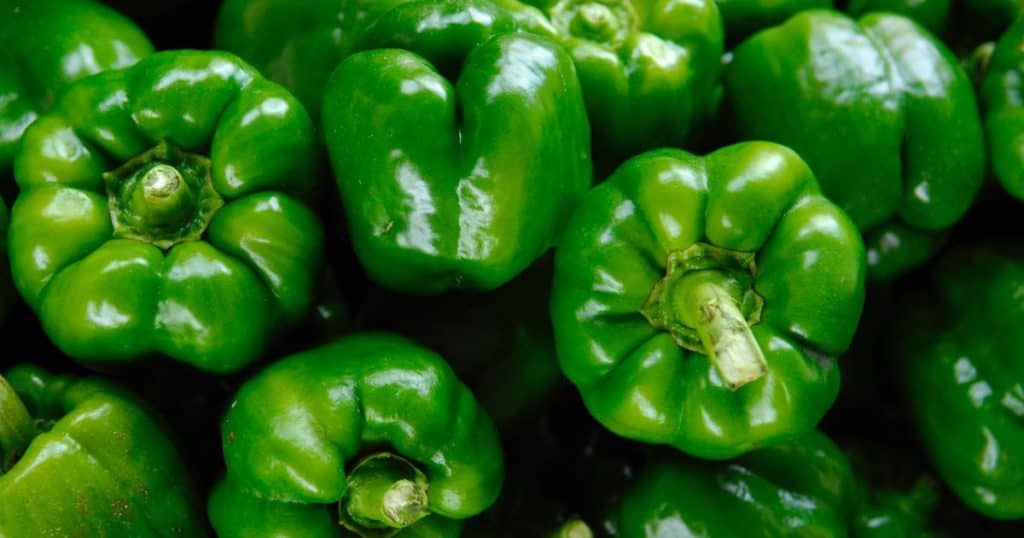Table of Contents
Are you wondering if can dogs eat bell peppers and if are safe for your furry friend to consume?
As a pet owner, it can be challenging to determine which human foods are safe and which ones are harmful to your dog. While some foods like chocolate and grapes are off-limits, other human foods, such as bell peppers, can be a healthy addition to your dog’s diet.
Bell peppers are a nutritious vegetable that is low in calories and high in vitamins and minerals. They are an excellent source of vitamin C, vitamin A, and fiber, making them a healthy snack for humans and dogs alike.
However, before feeding your dog bell peppers, it is essential to understand the benefits and risks associated with this food.
In this article, I will explore the question of whether can dogs eat bell peppers. I will provide you with accurate and up-to-date information from reputable sources to help you make an informed decision about whether to add bell peppers to your dog’s diet.
What are Bell Peppers?

Bell peppers, also known as sweet peppers, are a type of fruit that belongs to the nightshade family. They come in a variety of colors, including green, red, yellow, orange, and even purple.
Bell peppers are a popular ingredient in many cuisines around the world and are often used raw in salads, cooked in stir-fries, or roasted in the oven.
One of the reasons why bell peppers are so popular is because they are low in calories but high in nutrients.
They are an excellent source of vitamins A and C, as well as fiber, potassium, and folate. In fact, red bell peppers contain more vitamin C than an orange, making them a great food for boosting your immune system.
Another benefit of bell peppers is that they are rich in antioxidants, which can help protect your cells from damage caused by free radicals.
Antioxidants are important for maintaining good health, and may even help reduce your risk of chronic diseases such as heart disease and cancer.
Can Dogs Eat Bell Peppers and Are Safe for Your Dog?

Benefits of Bell Peppers
Bell peppers are a great source of nutrition for dogs. They are low in calories and high in vitamins A, C, and K.
These vitamins help support a dog’s immune system, vision, and blood clotting abilities. Additionally, bell peppers contain fiber, which can help with digestion and weight management.
Bell peppers also contain antioxidants, which can help prevent cell damage and reduce the risk of certain diseases.
They are a healthy alternative to processed treats and can be a great addition to a dog’s diet when fed in moderation.
Risks of Bell Peppers

While bell peppers are generally safe for dogs to eat, there are a few things to keep in mind.
First, it’s important to remove the stem and seeds before feeding them to your dog. These parts can be difficult to digest and may cause gastrointestinal upset.
Additionally, some dogs may have difficulty digesting bell peppers, especially if they are fed in large quantities. In these cases, it’s best to start with small amounts and monitor your dog for any signs of digestive upset.
Finally, it’s important to note that other types of peppers, such as jalapeños and habaneros, are not safe for dogs to eat. These peppers can cause digestive upset, vomiting, and diarrhea.
In summary, bell peppers can be a healthy and nutritious addition to a dog’s diet when fed in moderation. They are a great source of vitamins and antioxidants and can help support a dog’s overall health and well-being.
However, it’s important to remove the stem and seeds before feeding them to your dog and to monitor your dog for any signs of digestive upset.
How to Feed Bell Peppers to Your Dog?
Preparation Tips
Before feeding bell peppers to your dog, it is important to prepare them properly. Here are some tips:
Remove the seeds and stems
Only offer your dog the flesh of the peppers. Cut out the seeds and stem.
Cook the peppers
Many dogs find the outer skin of raw peppers too tough to consume, so steam your peppers before offering them as a treat or puréeing them to add to homemade dog food.
Wash the peppers
Always wash the peppers before offering them to your dog to remove any dirt, pesticides, or other harmful substances.
Serving Suggestions
Once you have prepared the bell peppers, you can serve them to your dog in a variety of ways:
- As a treat: Cut the peppers into bite-sized pieces and offer them to your dog as a healthy and tasty treat.
- Mixed into food: You can add chopped or puréed bell peppers to your dog’s regular food to give them an extra boost of vitamins and nutrients.
- Stuffed with other ingredients: You can stuff bell peppers with other dog-friendly ingredients like rice or ground meat for a tasty and nutritious meal.
Remember to always introduce new foods to your dog’s diet gradually and in moderation. While bell peppers are generally safe for dogs to eat, some dogs may have an allergic reaction or digestive issues.
If you notice any signs of discomfort or illness after feeding your dog bell peppers, stop feeding them immediately and consult your veterinarian.
FAQs
Here are some frequently asked questions about feeding bell peppers to dogs:
Can I give my dog any color of bell pepper?
Yes, all colors of bell peppers are safe for dogs to eat, according to veterinary experts. Bell peppers are a great source of vitamins and antioxidants and can be a healthy addition to your dog’s diet.
How much bell pepper can I give my dog?
Bell peppers should be given to dogs in moderation as an occasional treat, rather than a regular part of their diet. Too much of any human food can upset a dog’s stomach and lead to digestive issues. A general rule of thumb is to give your dog a small slice of bell pepper (without seeds or stems) as a treat once in a while.
What are the benefits of feeding bell peppers to my dog?
Bell peppers are a great source of nutrients for dogs, including vitamins A, C, and E, as well as antioxidants. These vitamins and antioxidants can help support a healthy immune system, promote good vision, and even help prevent certain types of cancer in dogs.
Can bell peppers be harmful to dogs in any way?
While bell peppers are generally safe for dogs to eat, there are a few things to keep in mind. First, some dogs may be allergic to bell peppers or other types of vegetables, so it’s important to monitor your dog for any signs of an allergic reaction after giving them a small piece of bell pepper. Additionally, the seeds and stems of bell peppers can be difficult for dogs to digest and may cause digestive issues, so it’s best to remove these parts before giving bell peppers to your dog.
Before You Go
After researching and consulting with veterinary experts, it is clear that bell peppers are safe for dogs to eat. They offer a range of nutritional benefits and can be a healthy addition to a balanced diet for your furry friend.
However, it is important to note that while bell peppers are safe for dogs, they should be given in moderation. Too much of any human food can upset a dog’s stomach and lead to digestive issues. Additionally, it is important to never add seasonings or spices to bell peppers when feeding them to your dog.
If you are considering adding bell peppers to your dog’s diet, it is recommended to consult with a veterinary nutritionist to ensure that their overall diet is balanced and meets their specific nutritional needs. Additionally, it is important to introduce any new food gradually and monitor your dog’s reaction to ensure that they tolerate it well.
Overall, while bell peppers can be a healthy addition to your dog’s diet, it is important to remember that they should not make up a significant portion of their overall food intake. As with any new food, it is important to introduce them in moderation and consult with a veterinary expert to ensure that your dog’s diet is balanced and meets their specific nutritional needs.
Related Articles:




Leave a Reply
You must be logged in to post a comment.